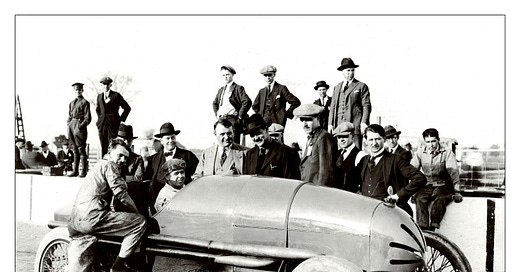Why motorsport history matters — and why you should care
Racing was crazier back in the day than you can even imagine

We're approaching that time of year where contemporary racing is kicking off in full force (and does anyone else feel like we've had a frankly ridiculous amount of massive, earth-shattering news this year, well before Formula 1 has actually gotten started????), which means all eyes are on the ever-evolving news cycle. It's easy to get caught up, which means it is entirely reasonable to wonder why a history podcast should take priority in your brain space. Perhaps I'm a little biased, but I think I've got a few reasons.
Let's talk about it.
What Even Qualifies As Motorsport "History"?
I think most people probably understand vaguely what motorsport history is, but as I've put together DPTJ, I've operated on two different definitions.
Individual ideas of history: What qualifies as "history" is generally different for everyone. Brand-new racing fans might consider 2017 to be historical, while longer-term fans will probably reach further back in time. Essentially, I feel that everyone has a different basis of operating knowledge and therefore that they'll have different ideas of history.
Broader, more conceptual history: There are also those moments in history that everyone considers to be historic. These are generally moments that stretch way back, ones that pre-date current living fans' actual, lived experiences.
Understanding how those two subjective interpretations of history play together was a critical element in developing this podcast. I wanted to share stories that few people might have heard of, but I also had to balance my desire to reach way back into the archives with the fact that that could be really off-putting to someone who's primarily familiar with more contemporary racing. I want to share stories that just about everyone will find interesting, ones they haven't heard of before — but I'm also really conscious of the fact that I can't take anything for granted. History is subjective, and your ability to care about it largely depends on the person telling you that history.
Now that we've got that out of the way, let's talk about why racing history matters.
Keep reading with a 7-day free trial
Subscribe to Deadly Passions, Terrible Joys to keep reading this post and get 7 days of free access to the full post archives.



